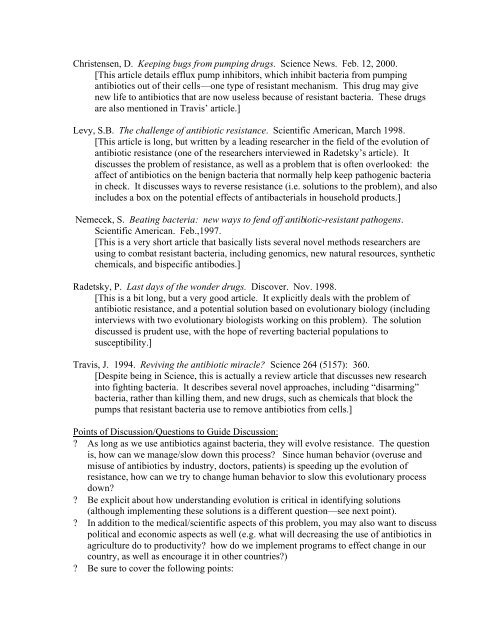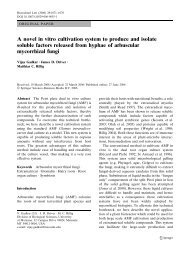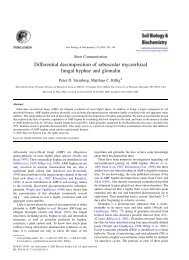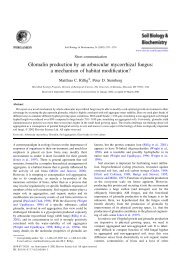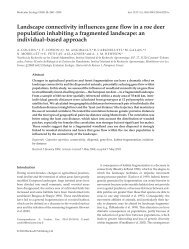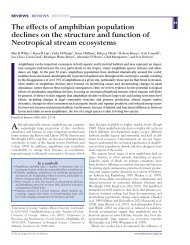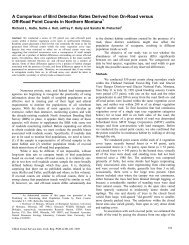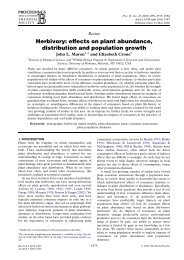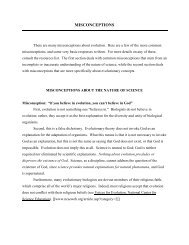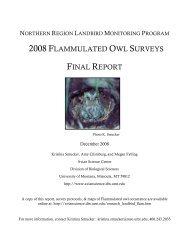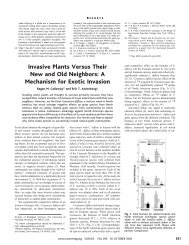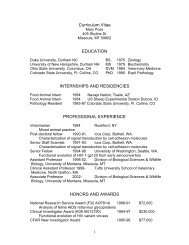Evolution of Antibiotic Resistance-Printable Format - Teach ...
Evolution of Antibiotic Resistance-Printable Format - Teach ...
Evolution of Antibiotic Resistance-Printable Format - Teach ...
You also want an ePaper? Increase the reach of your titles
YUMPU automatically turns print PDFs into web optimized ePapers that Google loves.
Christensen, D. Keeping bugs from pumping drugs. Science News. Feb. 12, 2000.<br />
[This article details efflux pump inhibitors, which inhibit bacteria from pumping<br />
antibiotics out <strong>of</strong> their cells—one type <strong>of</strong> resistant mechanism. This drug may give<br />
new life to antibiotics that are now useless because <strong>of</strong> resistant bacteria. These drugs<br />
are also mentioned in Travis’ article.]<br />
Levy, S.B. The challenge <strong>of</strong> antibiotic resistance. Scientific American, March 1998.<br />
[This article is long, but written by a leading researcher in the field <strong>of</strong> the evolution <strong>of</strong><br />
antibiotic resistance (one <strong>of</strong> the researchers interviewed in Radetsky’s article). It<br />
discusses the problem <strong>of</strong> resistance, as well as a problem that is <strong>of</strong>ten overlooked: the<br />
affect <strong>of</strong> antibiotics on the benign bacteria that normally help keep pathogenic bacteria<br />
in check. It discusses ways to reverse resistance (i.e. solutions to the problem), and also<br />
includes a box on the potential effects <strong>of</strong> antibacterials in household products.]<br />
Nemecek, S. Beating bacteria: new ways to fend <strong>of</strong>f antibiotic-resistant pathogens.<br />
Scientific American. Feb.,1997.<br />
[This is a very short article that basically lists several novel methods researchers are<br />
using to combat resistant bacteria, including genomics, new natural resources, synthetic<br />
chemicals, and bispecific antibodies.]<br />
Radetsky, P. Last days <strong>of</strong> the wonder drugs. Discover. Nov. 1998.<br />
[This is a bit long, but a very good article. It explicitly deals with the problem <strong>of</strong><br />
antibiotic resistance, and a potential solution based on evolutionary biology (including<br />
interviews with two evolutionary biologists working on this problem). The solution<br />
discussed is prudent use, with the hope <strong>of</strong> reverting bacterial populations to<br />
susceptibility.]<br />
Travis, J. 1994. Reviving the antibiotic miracle? Science 264 (5157): 360.<br />
[Despite being in Science, this is actually a review article that discusses new research<br />
into fighting bacteria. It describes several novel approaches, including “disarming”<br />
bacteria, rather than killing them, and new drugs, such as chemicals that block the<br />
pumps that resistant bacteria use to remove antibiotics from cells.]<br />
Points <strong>of</strong> Discussion/Questions to Guide Discussion:<br />
? As long as we use antibiotics against bacteria, they will evolve resistance. The question<br />
is, how can we manage/slow down this process? Since human behavior (overuse and<br />
misuse <strong>of</strong> antibiotics by industry, doctors, patients) is speeding up the evolution <strong>of</strong><br />
resistance, how can we try to change human behavior to slow this evolutionary process<br />
down?<br />
? Be explicit about how understanding evolution is critical in identifying solutions<br />
(although implementing these solutions is a different question—see next point).<br />
? In addition to the medical/scientific aspects <strong>of</strong> this problem, you may also want to discuss<br />
political and economic aspects as well (e.g. what will decreasing the use <strong>of</strong> antibiotics in<br />
agriculture do to productivity? how do we implement programs to effect change in our<br />
country, as well as encourage it in other countries?)<br />
? Be sure to cover the following points:


